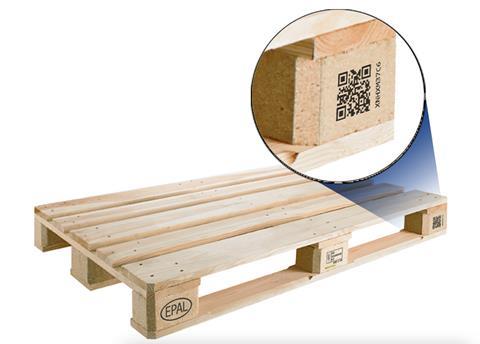Epal has launched a traceable pallet that features a scannable code linked to a unique serial number, as it looks to improve efficiency across supply chains
Epal (European Pallet Association) UK & Ireland, the umbrella association of licensed producers and repairers of Epal load carriers, has announced the launch of a traceable pallet that it says “significantly improve the traceability and efficiency of users’ supply chains”.

The Epal Euro QR pallet features a scannable code linked to a unique serial number, which the association says boosts supply chain visibility, improves efficiency, and optimises stock management.
Located on the right-hand side of the pallet, the QR code can be linked to the goods being transported, and gives users other essential information such as the pallet manufacturer, age of the pallet, how many times it has been used in the Epal network, the number of repairs it has had, storage times, and location.
“Pallet users can share this information easily with their partner suppliers and customers in the supply chain,” Epal states. “The improved visibility will reduce pallet loses because it enables businesses to know exactly where their pallets are located and enable swift action in the case of events such as product recalls.
The QR code is marked on the Euro pallets with long-lasting inkjet printing, which has been successfully tested within the Epal network, and is readable with a standard barcode reader.
“The Euro QR pallet is a significant development for Epal, adding traceability to the list of benefits users already enjoy from being part of the EPAL network,” explains Felicity Smith, national secretary for Epal UK and Ireland.
“It is an innovation that means Epal pallets now not only protect the goods they are carrying but can also provide operational data that is essential for an efficient modern supply chain.”
The Euro QR pallets are manufactured and repaired to the same independently audited quality standards as regular Epal pallets, the association notes, with the pallets freely exchangeable within the existing Epal international pallet pool across 35 countries.



